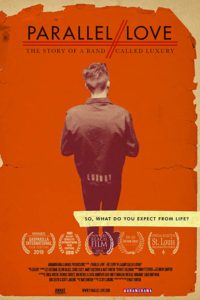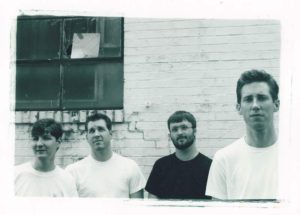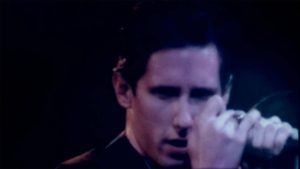 There is a whole generation of people (myself included) that were raised on CCM (Contemporary Christian Music) artists, most of which was a mere husk in form of popular music that was created at the same time. For every Michael Bolton, there was a Michael W. Smith. For every Alanis Morrisette, there was a Rebecca St. James. So on and so forth. This isn’t to say that there wasn’t some good music coming out of the Christian-baptized for-profit machinery that was this music scene. However, many of the best bands eventually found their way outside of the CCM to their own labels or finally made their way into the mainstream music labels. Like any music genre, there is always an underground element that eventually shifted the sounds of bands in the mainstream from the roots. Christian music had this as well and these are the artists that largely continue to create and make music that is just as profound as it was when they were started.
There is a whole generation of people (myself included) that were raised on CCM (Contemporary Christian Music) artists, most of which was a mere husk in form of popular music that was created at the same time. For every Michael Bolton, there was a Michael W. Smith. For every Alanis Morrisette, there was a Rebecca St. James. So on and so forth. This isn’t to say that there wasn’t some good music coming out of the Christian-baptized for-profit machinery that was this music scene. However, many of the best bands eventually found their way outside of the CCM to their own labels or finally made their way into the mainstream music labels. Like any music genre, there is always an underground element that eventually shifted the sounds of bands in the mainstream from the roots. Christian music had this as well and these are the artists that largely continue to create and make music that is just as profound as it was when they were started.
Artists like Pedro The Lion, Sufjan Stevens, Over the Rhine, and Starflyer 59 were influencers on the Christian music scene. This was because they didn’t have the burden of fame and profit to make them burn out like many of the CCM bands and those bands that crossed over to the mainstream radio. All of the musicians above are still making music to this day and their legacy holds strong.
However, there is another type of underground musician that doesn’t get the credence they deserve. Their music was unlike anything else in the realm of Christian musicianship, but they are the artists that the more known artists name as inspiration. One such band is Luxury and the new music documentary, Parallel Love, from Matt Hinton, director of 2006’s Awake, My Soul: The Story of the Sacred Harp, seeks to finally push their name to the surface for a new generation of music lovers to find and for Christians to be floored by the potential for creative landscapes that could be traversed by the faithful.
 Jeremy, a good friend of mine, introduced me to the band a few years back and while I liked the album he played for me, it just wasn’t the right time for me to grapple with the band. Some bands take time and maturity to engage. A couple of years later, I came back to the album and I began to connect with it more and I started a brief exploration of their back catalog. It didn’t last long for the constant stream of cultural content moves on to be consumed and forgotten. Then I found out that a documentary was being made about the band and also that three of the members of the band had become Eastern Orthodox priests. If you are anything like me, this kind of information requires focused exploration and so I dove into all of the music they did as a band and their solo material. And, folks, I don’t think there is another band who ran within the Christian music circles more fascinating and musically intelligent than Luxury.
Jeremy, a good friend of mine, introduced me to the band a few years back and while I liked the album he played for me, it just wasn’t the right time for me to grapple with the band. Some bands take time and maturity to engage. A couple of years later, I came back to the album and I began to connect with it more and I started a brief exploration of their back catalog. It didn’t last long for the constant stream of cultural content moves on to be consumed and forgotten. Then I found out that a documentary was being made about the band and also that three of the members of the band had become Eastern Orthodox priests. If you are anything like me, this kind of information requires focused exploration and so I dove into all of the music they did as a band and their solo material. And, folks, I don’t think there is another band who ran within the Christian music circles more fascinating and musically intelligent than Luxury.
The documentary goes from the formation of the band at a fundamentalist Christian college, to their eventual rise to potential mainstream success, to the car wreck that nearly claimed the lives of members of the band, and the life of the band in the wake of that event. That wreck made them confront the metaphysical realities of death. It was no longer just an abstract idea somewhere in the future. It could come at any moment.
While the documentary form does not depart from the general formula of music documentaries, the subject matter and the transitions happening in the life of the band and its members keeps it compelling from beginning to end. There is darkness in the lives of this band, but, on the whole, they are counter examples of the usual documented musician because they are largely well-adjusted individuals. The biggest conflict in the film comes within the ambiguity of the lyrics of the lead singer, Lee Bozeman. For instance, here are a couple of lines from their song “Pink Revenge”:
“Thirteen, it shook your world when you first knew
Now it’s up with pink and down with blue
Once it was James, now June…
And sometimes it’s like a strange little game
Between two: me and you
But you’ll never be a lady
You’ll never be a lady, never be a lady
No, not like me”
 There were some in Christian circles who were thrown off by what they took to be sentiments around homosexuality or transsexuality from Lee. Matt asks Lee in the documentary if this was an intentional meaning within his lyrics and he kind of chuckles and states that it wasn’t a thought in his head. DM Stith, an electronic/indie artist, said that some of Lee’s lyrics strongly represented Lee’s repressed sexual feelings. While Lee, a happily married man and priest, continues to deny this, there is no way to know the full truth of the matter. That’s the power of art. The varied meanings can transcend tribal divisions.
There were some in Christian circles who were thrown off by what they took to be sentiments around homosexuality or transsexuality from Lee. Matt asks Lee in the documentary if this was an intentional meaning within his lyrics and he kind of chuckles and states that it wasn’t a thought in his head. DM Stith, an electronic/indie artist, said that some of Lee’s lyrics strongly represented Lee’s repressed sexual feelings. While Lee, a happily married man and priest, continues to deny this, there is no way to know the full truth of the matter. That’s the power of art. The varied meanings can transcend tribal divisions.
The cleverness of Lee’s lyricism is matched by the punk sensibilities of the band’s music. It is less Minor Threat, more Fugazi or Joy Division. The rest of the band—including Jamey Bozeman on guitar, Chris Foley on bass, Glenn Black on drums, and, later on, Matt Hinton, himself, on guitar, banjo, and mandolin—wore their influences loosely in their compositions. They don’t sound completely like any singular band, but like the best elements of several bands that blazed the musical trails before them. From their lo-fi punk sound on their early Eps (as The Shroud) to their new album, Trophies, which is richly textured in atmospherics and walls of noise and distortion. There is much that could be said about this band, but bland is not one of them.
 The only area I wished the documentary had explored more in depth is the internal movement towards the Eastern Orthodox Church. In one way, I could see this being beside the point of the documentary because within the scope of an exploration of the band and its music, it doesn’t quite make the cut. However, there is a lot of weariness within American Evangelicalism and that weariness is playing itself out in people finding comfort in high church forms of Christianity or by giving up the faith totally, like the Exvangelical movement of late. In this current cultural space within American Christianity, it would have made for a fascinating exploration to have expanded on how the band members retained their faith in the midst of their near rise to the mainstream and their continual battle between their faith and their music. Something had to draw them to the Eastern Orthodox faith and I think that part of the story, while maybe tangential, would have given the documentary more local color than it already had.
The only area I wished the documentary had explored more in depth is the internal movement towards the Eastern Orthodox Church. In one way, I could see this being beside the point of the documentary because within the scope of an exploration of the band and its music, it doesn’t quite make the cut. However, there is a lot of weariness within American Evangelicalism and that weariness is playing itself out in people finding comfort in high church forms of Christianity or by giving up the faith totally, like the Exvangelical movement of late. In this current cultural space within American Christianity, it would have made for a fascinating exploration to have expanded on how the band members retained their faith in the midst of their near rise to the mainstream and their continual battle between their faith and their music. Something had to draw them to the Eastern Orthodox faith and I think that part of the story, while maybe tangential, would have given the documentary more local color than it already had.
Nonetheless, the documentary makes for an enjoyable and fascinating watch. There are enough perspectives featured to feed the reality and the mythos around the band, showing how both play an important part in musical creativity. If you don’t come away from this documentary at least being curious about or seeking out their music, then I might have to come to your house and convince you myself.


